No plaque marks the historic meeting place of the fathers of two nations. And no history textbook tells us about that first meeting and their mutual admiration, common ethos and comradeship, reports Mrigank Warrier.
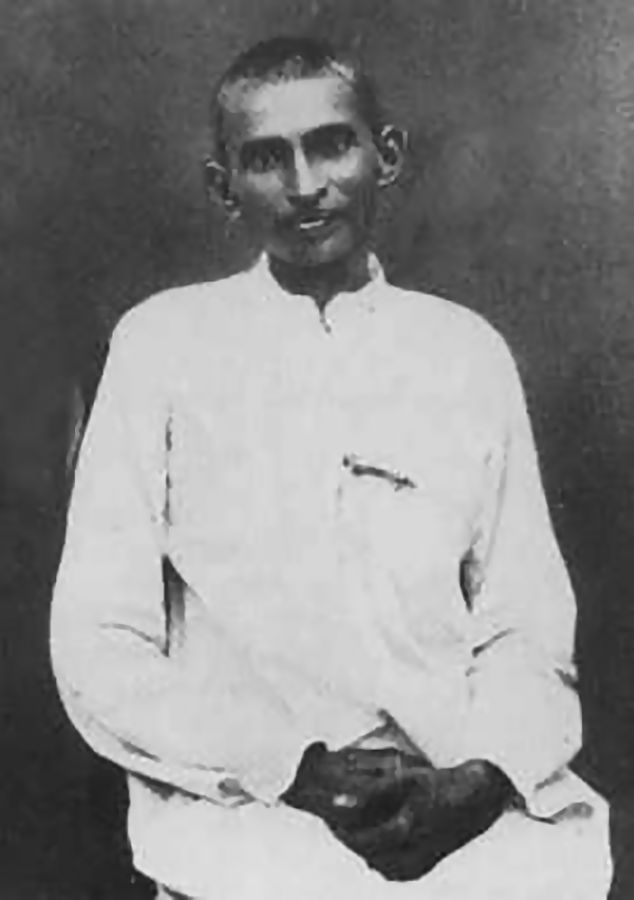
Thirteen long years had passed since the middle-aged man had last seen India.
On January 9, 1915, Mohandas Karamchand Gandhi was 45 years old and sailing towards Bombay aboard the SS Arabia.
That day's Bombay Chronicle had reported that Mrs and Mr Gandhi were expected to alight at Apollo Bunder, where the Gateway of India was still being constructed to commemorate the arrival of a British emperor who had already departed.
After two-score-and-more years of activism that dismantled discrimination against Indians in another of the emperor's dominions -- South Africa -- Gandhi's renown had preceded him.
Satyagraha, his chosen method of protest, was innocuous enough for even the British viceroy of India to give a speech in his support.
Mohandas in the motherland
When he sighted the coast, his eyes filled with tears of joy, wrote Gandhi in a letter written shortly after he disembarked.
Dressed in a dhoti, a loose coat reaching his knees, a shoulder scarf and a Kathiawadi turban all made of rough Indian mill cloth, his humble costume was commented upon in the newspapers of the day.
A modest crowd had gathered to welcome him -- a token assembly, compared to the throngs he would attract later as the Mahatma.
Why? Perhaps because, when World War I ignited the previous year, Gandhi had started forming an Indian Ambulance Corps in England to help the British war effort
Gandhi had suffered an attack of pleurisy, and his wife Kasturba 'a relapse of an old malady' the need to recover and recuperate had brought them back from London to healthier Indian climes.
In Bombay, rumours spread of government spies following Gandhi from the instant he set foot on Indian soil.
The British governor of Bombay worried about Gandhi's return amongst his countrymen; he specifically asked Gandhi to bring to his notice any specific grievances he might have against the government, before embarking on any agitation!
The city was not the rest-cure Gandhi needed.
Writing to a relative, he complained: 'I don't like Bombay, though. It looks as if it were the scum of London. I see here all the shortcomings of London but find none of its amenities.'
Matters deteriorated further; he was obliged to attend reception after reception in his honour, from then-faraway Ghatkopar (now in north east Mumbai) to tony Peddar Road (south Mumbai).
'I feel suffocated by this public honouring,' he wrote. 'I have not known a moment's peace. There is an endless stream of visitors. Neither they nor I gain anything.'
Gandhi before Mahatma
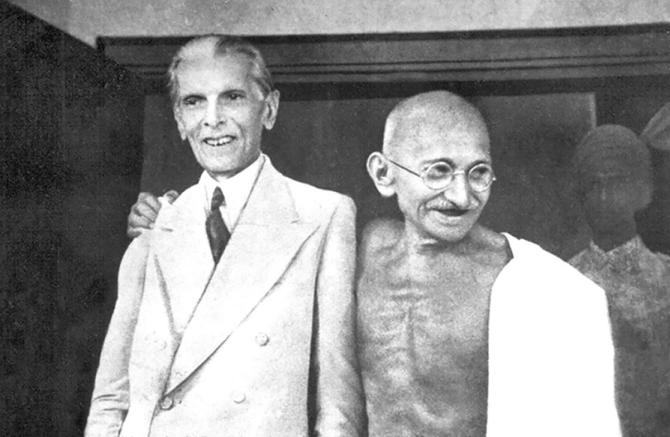
It is from one such meeting at Santa Cruz (north west Mumbai), convened soon after he reached Bombay, that we get an eye-witness's account of Gandhi's early interactions with his fellow Indians in India.
Indulal Yagnik -- then 23, he later became Gandhi's colleague in the freedom struggle -- described the moments before Gandhi began speaking in his book, Gandhi As I Know Him: 'My curiosity and enthusiasm rose to the highest pitch. My heart was thumping within me. He began in a very quiet, low voice -- he was, perhaps, not audible to all in the big hall.'
Gandhi thanked the organisers, pleaded that he was not worthy of the compliments showered upon him, promised to try and be worthy of them some day, and said he was afraid such praise would spoil him. That was all.
No moving rhetoric. No call to action. Just a polite thank you, excuse me, bye.
Yagnik was disappointed, shattered, dumbfounded, miserable and ran away, choking with rage and indignation. He had expected that Gandhi 'would give the word and India would be launched on the turbulent ocean of a new political movement'.
But nothing happened.
One more celebration
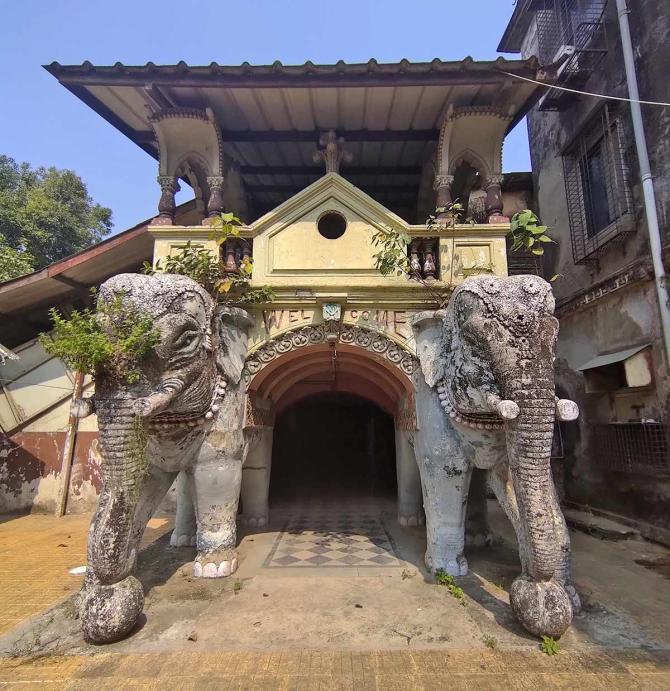
On January 14, 1915, Bombay's Gujrat Sabha (also known as the Gurjar Sabha, depending upon the source) decided to throw a garden party for Mohandas and Kasturba Gandhi on the grounds of Mangaldas House at Lamington Road (south Mumbai).
Sir Mangaldas Nathubhai, who had passed away a quarter of a century earlier, was one of the first Indians to be knighted. He had also founded one of the earliest Indian-owned mills; fittingly, his home witnessed a momentous meeting that altered the destiny of the subcontinent.
Yagnik happened to be the secretary of the group hosting the party. Since refreshments needed to be arranged, Gandhi was asked what he might like to partake. Fruits and nuts, came the answer.
But who would chair the party-that-was-a-meeting? That responsibility fell on a wildly successful lawyer (which Gandhi was not, by his own admission) whose political star then shone brighter than Gandhi's in India; who had also lately returned from London after representing the Indian National Congress in talks with British officials there -- Muhammad Ali Jinnah.
Let the party begin
Speaking in English, freedom-fighter and writer K M Munshi began by calling Gandhi 'the greatest son of modern Gujarat'.*
Jinnah then rose and, continuing in the same language, said that he considered it a great privilege and certainly a very great honour that he should have the opportunity of welcoming Mrs and Mr Gandhi back to their motherland after their most strenuous and hard labour in South Africa, in the cause of the Indians residing there as well as in the cause of Indians in general.
Hindus and Muslims had presented a united political and moral front in South Africa, Jinnah continued; it was that same frame of mind which they had to bring about between the two communities in India.
Most of their problems, he had no doubt, would then be easily solved. 'That is one problem of all the problems of India, namely, how to bring about unanimity and cooperation between the two communities so that the demands of India will be made absolutely unanimously.'
Gandhi surprised the audience by replying in Gujarati.
He spoke of the importance of discarding English in favour of Indian languages for national undertakings. And not much else. Again, no grandstanding, no rousing appeal.
What he left unsaid is this.
Gopal Krishna Gokhale -- political mentor to both Jinnah and Gandhi -- had advised him that, having been away from India for so long, he should spend some time here as 'an observer and a student' before forming definite conclusions on any matters Indian.
Gandhi did mention that in South Africa, when one spoke of Gujaratis, one only thought of Hindus; Parsis and Muslims were not counted. Therefore, he was glad to see a 'Mohammedan' as member of the Gujrat Sabha and chairman of its meeting.
Then he ate his fruits and nuts and left.
One century later...
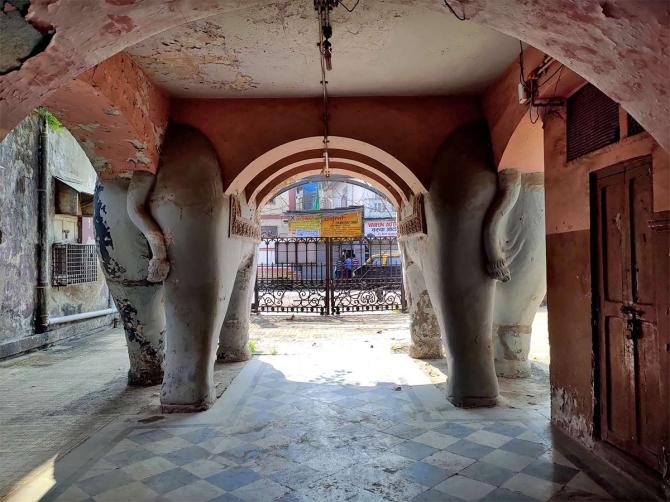
Today, there is no sign of the garden where India's Father of the Nation first met Pakistan's Baba-i-Qaum ('Father of the Nation').
Mangaldas House is in shambles and the statue of a huge elephant -- a Mangaldas family motif -- is hidden in the shadows of a garage on the property.
The garden is buried under a once-grand theatre -- called the Imperial, ironically -- now reduced to showing lewd C-grade films.
A handwritten sign warns movie-watchers that those caught doing 'wrong things' will be handed over to the police.
Google Imperial Cinema and you will find message boards describing sexual acts; it is a cruising spot for gay men.
I've watched a movie here; some men tried to pick me up, but, like Gandhi, I did not feel worthy of their attention and politely left.
No plaque marks the historic meeting place of the fathers of two nations. And no history textbook tells us about that first meeting and their mutual admiration, common ethos and comradeship.
*The details of the meeting are mentioned in the book, Mahatma Gandhi -- India Awakened by Sushila Nayar.
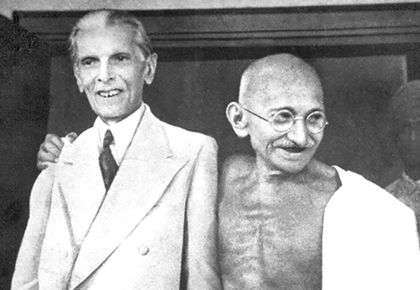

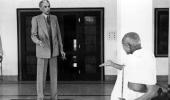









 © 2025
© 2025